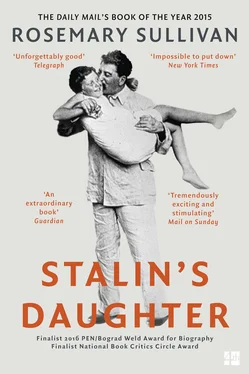Svetlana remembered her mother hitting her only once. A new tablecloth made of disk-shaped pieces of embroidery hung alluringly from the dining room table. When Svetlana took her scissors and cut out one of the disks—they were so beautiful—her enraged mother slapped her across the face. 24It was a terrible shock. When Stalin heard her cry, he came running to comfort her.
Svetlana reciprocated this role of placater. When her mother and father were arguing, she would run to her father and wrap her small hands around his boot. Only then would he calm down. Nadya’s close friend Irina Gogua, witness to such domestic arguments, remarked, “The only creature who softened [Stalin] was Svetlana.” 25
If her mother was cool, Svetlana got the emotional response she craved from her father. She was Stalin’s favorite child. He called her his “little sparrow” or “little fly.” It was to his knees that she flew, and from him she got the kisses and caresses her mother withheld. She took his constant absences for granted; they made his appearances all the more dramatic and the child all the more needy.
It was Nadya who embraced the Svanidze side of the family. She was particularly protective of Yakov, whom Stalin apparently treated with contempt. The adolescent boy spoke only Georgian when he joined the household. Svetlana thought this was one of the reasons her father seemed to dislike him. Stalin was reportedly self-conscious of his own Georgian-accented Russian. Svetlana would say that her father “knew Russian well in its simpler, conversational form; . . . in Russian he could not be an eloquent orator or writer, lacking synonyms, nuances, depths.” 26Instead he often used silence to assert his authority, a much more effective tool to control others, who could never figure out quite what Stalin was thinking.
As a child, Svetlana didn’t even know that her father’s roots were Georgian. Once her brother Vasili, who constantly teased her, told her that the family were Georgians. When Svetlana asked him what being Georgian meant, he said that “they went around in long Circassian cloaks and cut everybody up with daggers.” 27Svetlana claimed that Stalin, seeking to distance himself from his roots, banned visiting Georgian colleagues from bringing the usual gifts of Georgian wines and fruit, raging that such generosity came at public expense, and Nadya concurred.
Looking back, Svetlana said the room she most loved in their Moscow apartment was her mother’s room. In her mother’s absence, she would retreat there whenever she could to sit on its thick, raspberry-colored Oriental rug or curl up on the old-fashioned Georgian takhta (divan) with its embroidered cushions. She loved to touch the books on Nadya’s desk and drawing table. Given the dangerous household in which she grew up, Svetlana needed this idealized image of the beloved mother for psychic survival, but the outsider sees only an absent mother and a desperate, emotionally needy child. Of course, the truth was that Nadya herself was barely surviving.
Buried in the minds of those of us who are lucky is a childhood landscape, a place of magic and imagination, a safe place. It is foundational, and we will return to it in memory and dreams throughout our lives. Despite what her life would become, Svetlana had such a place.
As a member of Lenin’s inner circle, Stalin was awarded a dacha called Zubalovo. It was not far from the village of Usovo, about twenty miles outside Moscow. The family lived there weekends and summers from 1919 to 1932, and the extended family continued to visit until 1949, long after Nadya’s death.
The dacha took its name from the former owner, Zubalov, an Armenian oil magnate from Baku. The whole area around Usovo had once served as a vacation retreat for the wealthy in prerevolutionary Moscow. After the owners fled during the Revolution, the dachas were divided among the Party elite. Stalin and Anastas Mikoyan got Zubalovo. There was more than a small amount of revenge in this. Both men had directed strikes protesting the long working hours and miserable conditions at Zubalov’s oil refineries in Baku, Azerbaijan; and Batumi, Georgia.
On the expansive grounds of Zubalovo, there were three separate houses called the big house, the small house, and the service block, all surrounded by a redbrick wall. The larger one was taken over by Mikoyan and other Old Bolshevik families. Nadya’s siblings, the Alliluyevs, and some of the Svanidzes used the service block, while Stalin and Nadya had the smaller dacha. It was always filled with visitors. 28
Stalin immediately had the dacha remodeled, removing the gables and old furnishings. He had a balcony built on the second floor—“father’s balcony”—and a terrace covering the back of the house. Stalin and Nadya occupied the upstairs, while the children and visiting relatives and friends lived downstairs. Purple lilac bushes framed the front of the house, and a grove of white birch stood at a slight distance. There was a duck pond, an apiary, a fenced-in run for chickens and pheasants, an orchard, and a clearing where buckwheat was planted to attract the bees. This Bolshevik estate served much the same role as it had when owned by the industrial elite, “a small estate with a country routine of its own” as Svetlana described it. 29
As a child, Svetlana knew the landscape like her own skin. She knew where the best mushroom patches could be found; she fished every stream and pond with her grandfather and brother and discovered where the trout rested in the slipstreams. She knew where to pick the berries among the brambles, which left her arms and legs covered in scratches. She brought home buckets of berries for the cook and, happy and exhausted, waited for praise. Svetlana had her own garden plot to tend and her own rabbits to raise. The smell of the larch trees, the white skin of the peeling birches, the flamboyant green of the new leaves, the smell of Russian soil—all this imprinted itself on her mind.
During the summer many children of the ruling elite came to stay. She’d lead them to the poultry yard to collect the eggs of the guinea fowl and pheasants or take them out on expeditions to pick mushrooms. On the estate they had a tree house to climb into and swings and a seesaw to ride. The children went camping in the woods, sleeping in a lean-to overnight and fishing in the local river. They would cook their catches over the fire, and bake pheasant eggs in the hot cinders.
Stalin, who had learned to love Russian baths in Siberia, eventually had a banya built at Zubalovo. It was a roofed hut with birch branches in the eaves sending their fragrance over the bathers. When her father was absent, Svetlana used to read her children’s books there, spread out on a rug on the floor.
Relatives floated into and out of Zubalovo: her grandparents Olga and Sergei Alliluyev; her Aunt Anna and Uncle Stanislav; and Uncle Pavel and Aunt Zhenya. Uncle Pavel told stories of the time after the Civil War when Lenin sent him on an expedition to the far north to prospect for iron ore and coal. They’d lived in tents, ridden reindeer, and made their clothes from reindeer pelts. 30The Svanidzes also came to the dacha, particularly Uncle Alyosha and his dramatic wife, Maria. Stalin was often there but preoccupied. He could be found sitting at his table working on the terrace.
Svetlana’s grandparents, Olga and Sergei, were the dominant presences at the dacha. It was Sergei who brought Stalin into the Alliluyev household. The Russian-born son of a freed serf, he had trained himself as a mechanic and was working at the Tiflis rail yards when he joined the Mesame Dasi (Third Group), the Georgian socialist party formed in the early 1890s. He first met Stalin in 1900, when his future son-in-law was already famous locally for his brilliant organization and political exhortations at the clandestine May Day workers’ demonstrations. In those days, Sergei was mostly in charge of printing Marxist propaganda posters and leaflets, for which he was arrested and jailed seven times. Whether he participated in revolutionary violence is unclear, though he seemed to have had no objections when his nine-year-old daughter, Anna, was used by the revolutionaries as a mule to carry explosive cartridges sewn into her undervest on the train from Tiflis to Baku. 31Sergei offered the family’s apartment as a refuge for Stalin when he was hiding out from the tsar’s secret police.
Читать дальше











![John Bruce - The Lettsomian Lectures on Diseases and Disorders of the Heart and Arteries in Middle and Advanced Life [1900-1901]](/books/749387/john-bruce-the-lettsomian-lectures-on-diseases-and-disorders-of-the-heart-and-arteries-in-middle-and-advanced-life-1900-1901-thumb.webp)
